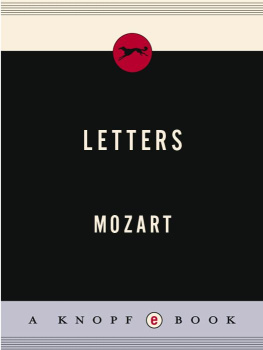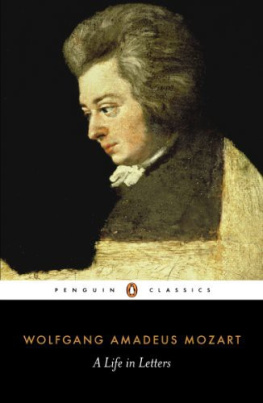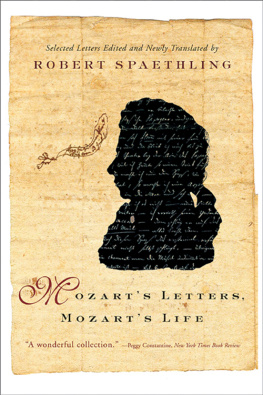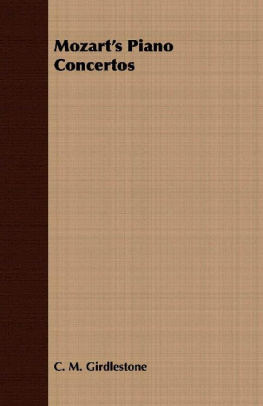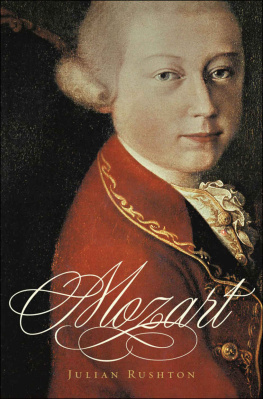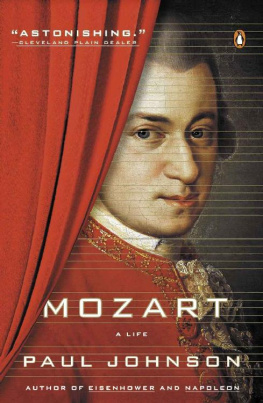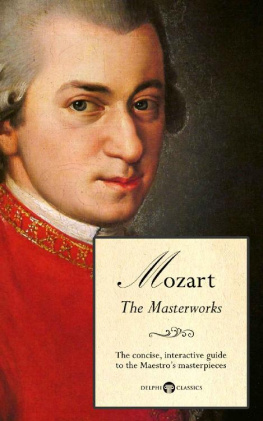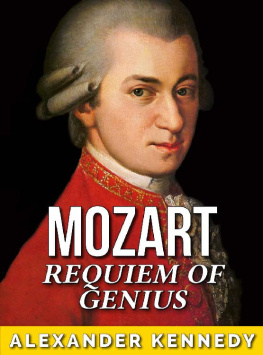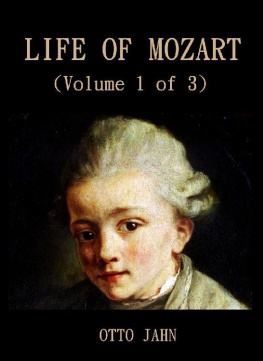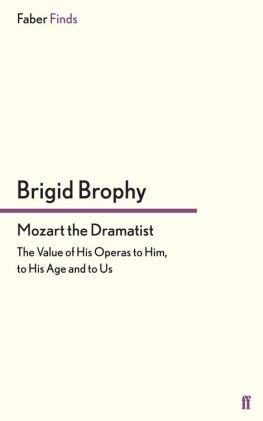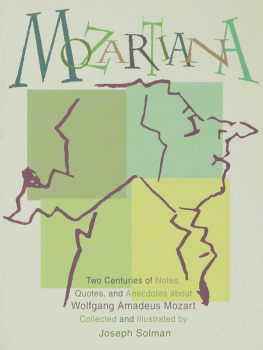THIS IS A BORZOI BOOK
PUBLISHED BY ALFRED A. KNOPF
This selection by Peter Washington and Michael Rose first published in
Everymans Library, 2006 (UK), 2007 (US)
Copyright 2006, 2007 by Everymans Library
All rights reserved. Published in the United States by Alfred A. Knopf, a division of Random House, Inc., New York, and in Canada by Random House of Canada Limited, Toronto. Distributed by Random House, Inc., New York. Published in the United Kingdom by Everymans Library, Northburgh House, 10 Northburgh Street, London EC1V 0AT. Distributed by Random House (UK) Ltd.
US website: www.randomhouse.com/everymans
eISBN: 978-0-307-82421-9
v3.1
Contents
FOREWORD
How Mozart found the time to be such a prolific and brilliant letter writer will always remain as much of a mystery as his musical genius. After more than two hundred years he still stands out as one of musics greatest correspondents, emerging from the pages which follow as a scintillating, fully rounded and intriguing character. About 1200 of the letters which passed between Mozart, his family and friends have survived, the most important of them written by the composer and his father. This selection is based on the translation by Lady Wallace first published in 1865, with extra material supplied by the editors. Despite their date, Lady Wallaces versions of the text are frank, lively and usually faithful. However, she did not have access to some of Mozarts later letters to Constanze. From tact or ignorance, she also omitted all but the mildest of his scatalogical references. A few of these have been restored by the editors to give a fuller picture of the man. We have also included relevant letters by Leopold Mozart not translated by Lady Wallace. Leopold exerted profound influence, not to say control, over Wolfgang until the old man died, only four years before his celebrated son. This epistolary portrait is completed by Barringtons description of the composer as a child prodigy, and an account of Mozarts last hours by his wifes youngest sister, Sophie.
THE LETTERS
176291
Mozarts father, Leopold, aware that his son was something out of the ordinary as a musical prodigy, was eager to exhibit his amazing abilities to as wide a public as possible. For this purpose it was necessary to get away from the provincial world of Salzburg (where Leopold held an appointment in the Archbishops Court), and throughout his childhood Wolfgang Mozart was constantly travelling, sometimes with his father and sister, later just with his mother, from one great European city to another. The first journey, to Munich in January 1762, was undertaken without Frau Mozart and has left no documentary record, but the second, to Vienna later in the same year, included the whole family. At this time Mozart was six and a half years old, his sister Nannerl just turned eleven.
Leopold Mozart to Lorenz Hagenauer, Salzburg
Vienna, 16 October 1762
On the feast of St. Francis we left Linz at half past four in the afternoon by the so-called ordinary boat and reached Mauthausen after nightfall on the same day at half past seven. At noon on the following day, Tuesday, we arrived at Ybbs, where two Minorites and a Benedictine, who were with us on the boat, said Masses, during which our Woferl played so well on the organ that the Franciscans, who happened to be entertaining some guests at their midday meal, left the table and with their company rushed to the choir and were almost struck dead with astonishment. In the evening we reached Stein and on Wednesday at three in the afternoon arrived at Vienna; here at five oclock we took our midday meal and supper at the same time. On the journey we had continual rain and wind. Wolfgang had already caught a cold in Linz, but in spite of our irregular life, early rising, eating and drinking at all hours, and wind and rain, he has, thank God, kept well. When we landed, Gilowskys servant, who was already there, came on board and brought us to our lodgings. But after leaving our luggage safely and tidily there, we soon hurried off to an inn to sate our hunger. Gilowsky himself then came to welcome us. Now we have already been here five days and do not yet know where the sun rises in Vienna, for to this very hour it has done nothing but rain and, with constant wind, has snowed a little now and then, so that we have even seen some snow on the roofs. Moreover it has been and remains very frosty, though not excessively cold. One thing I must make a point of telling you, which is, that we quickly got through the local customs and were let off the chief customs altogether. And for this we have to thank our Master Woferl. For he made friends at once with the customs officer, showed him his clavier, invited him to visit us and played him a minuet on his little fiddle. Thus we got through. The customs officer asked most politely to be allowed to visit us and for this purpose made a note of our lodgings. So far, in spite of the most atrocious weather, we have been to a concert given by Count Collalto. Further, Countess Sinzendorf introduced us to Count Wilschegg and on the 11th to His Excellency the Imperial Vice-Chancellor, Count Colloredo, where we were privileged to see and to speak to the leading ministers and ladies of the Imperial Court, to wit, the Hungarian Chancellor, Count Palffy, and the Bohemian Chancellor, Count Chotek, as well as Bishop Esterhzy and a number of persons, all of whom I cannot record. All, especially the ladies, were very gracious to us. Count Leopold Khnburgs fiance spoke to my wife of her own accord and told her that she is going to be married at Salzburg. She is a pretty, friendly woman, of medium height. She is expecting her betrothed in Vienna very shortly. Countess Sinzendorf is using her influence on our behalf, and all the ladies are in love with my boy. We are already being talked of everywhere: and when on the 10th I was alone at the opera, I heard the Archduke Leopold from his box say a number of things to another box, namely, that there was a boy in Vienna who played the clavier most excellently and so on. At eleven oclock that very same evening I received a command to go to Schnbrunn on the 12th. But the following day there came a fresh command to go there on the 13th instead (the 12th being the Feast of Maximilian and therefore a very busy gala-day), because, I understand, they want to hear the children in comfort. Everyone is amazed, especially at the boy, and everyone whom I have heard says that his genius is unbelievable. Baron Schell is using his influence on my behalf and is gratefully acknowledging the kindnesses he enjoyed at Salzburg. If you have a chance, please tell this to Herr Chiusolis with my respects. Count Daun also has given me a note for Baron Schell and has filled me with hopes that I shall leave Vienna fully content. And so it seems, since the Court is asking to hear us before we have announced ourselves. For young Count Palffy happened to be passing through Linz as our concert was about to begin. He was calling on the Countess Schlick, who told him about the boy and persuaded him to stop the mail coach in front of the town hall and attend the concert with her. He listened with astonishment and spoke later with great excitement of the performance to the Archduke Joseph, who told the Empress. Thus, as soon as it was known that we were in Vienna, the command came for us to go to court. That, you see, is how it happened.
I wrote the above on the 11th, fully intending to tell you on the 12th, after our return from Schnbrunn, how everything had proceeded. But we had to drive from Schnbrunn straight to Prince von Hildburghausen, and six ducats were more important to us than the despatch of my letter. I have sufficient confidence in Frau Hagenauer and trust enough to her kind friendship to know that she will accept even now our congratulations on her name-day and even in the short form of merely saying that we shall ask God to keep her and all her loved ones well and strong for many years to come and to invite us all in due course to play cards in Heaven. Now all that I have time for is to say hastily that Their Majesties received us with such extraordinary graciousness that, if I describe it, people will declare that I have made it up. Suffice it to say that Woferl jumped up on the Empresss lap, put his arms round her neck and kissed her heartily. In short, we were there from three to six oclock and the Emperor himself came out of the next room and made me go in there to hear the Infanta play the violin. On the 15th the Empress sent us by the Privy Paymaster, who drove up to our house in state, two dresses, one for the boy and one for the girl. As soon as the command arrives, they are to appear at court and the Privy Paymaster will fetch them. Today at half past two in the afternoon they are to go to the two youngest Archdukes and at four oclock to the Hungarian Chancellor, Count Palffy. Yesterday we were with Count Kaunitz, and the day before with Countess Kinsky and later with the Count von Ulefeld. And we already have more engagements for the next two days. Please tell everybody that, thank God, we are well and happy. I send greetings and I am your old

